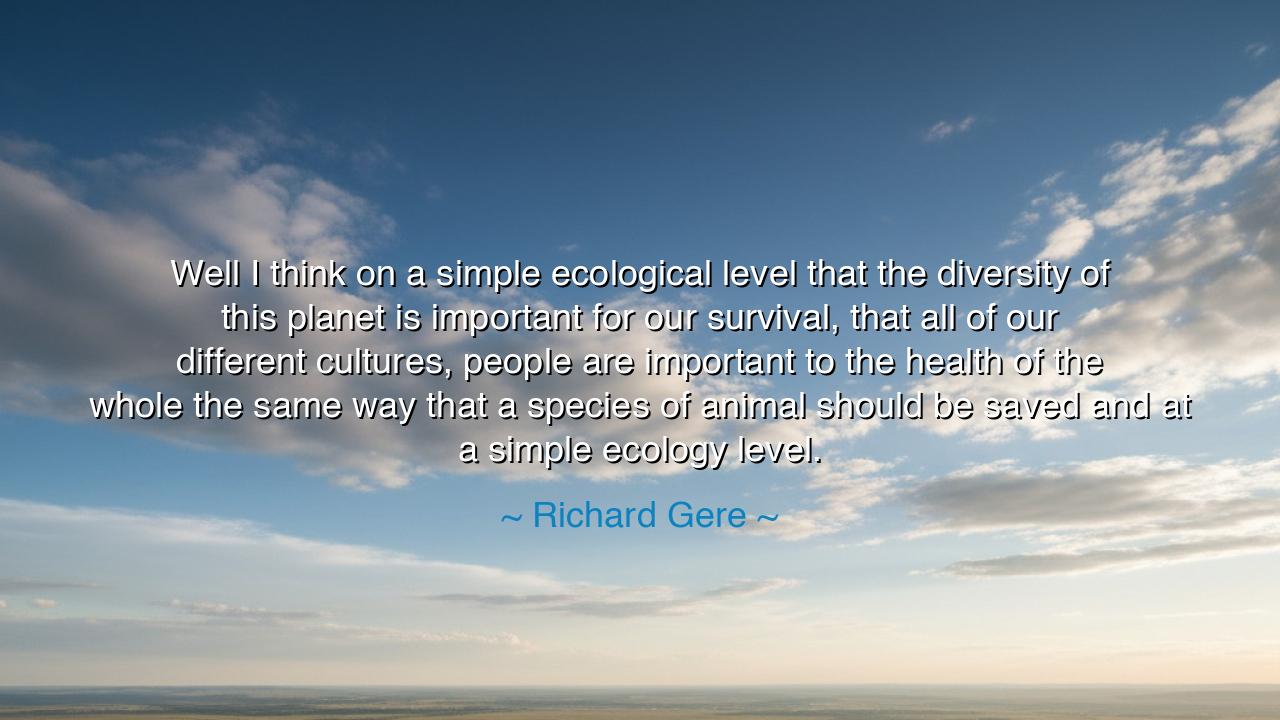
Well I think on a simple ecological level that the diversity of
Well I think on a simple ecological level that the diversity of this planet is important for our survival, that all of our different cultures, people are important to the health of the whole the same way that a species of animal should be saved and at a simple ecology level.






“Well I think on a simple ecological level that the diversity of this planet is important for our survival, that all of our different cultures, people are important to the health of the whole the same way that a species of animal should be saved and at a simple ecology level.” – Richard Gere
In these reflective and compassionate words, Richard Gere, the actor and humanitarian, reminds us of an ancient and eternal truth — that diversity is the lifeblood of creation. His insight flows from both the spiritual and the ecological realms: that all beings, whether human or animal, whether a single flower in the field or a tribe upon the earth, exist not in isolation but in interdependence. Gere speaks of the planet not as a machine to be used, but as a living organism — one whose health depends upon the balance and harmony of all its parts. Just as in nature, the extinction of one species weakens the web of life, so too does the loss of a culture, a people, or a voice diminish the collective strength of humanity.
The ancients knew this well. In the East, the sages of India and China spoke of the unity of opposites, of yin and yang, of the balance that sustains all things. The Greek philosopher Heraclitus taught that the harmony of the world arises from tension, not uniformity — that difference is not division, but creation’s breath. Gere’s words echo this ancient wisdom: that diversity is not chaos, but the sacred rhythm of existence. When he compares the preservation of cultures to the saving of endangered species, he reveals that humanity and nature are reflections of the same divine order. The health of the whole depends upon the flourishing of the parts.
Yet, his message carries also a warning — that modern civilization, in its hunger for uniformity and control, forgets the ecology of the soul. We build systems that prize conformity over culture, consumption over connection. We flatten the world into sameness, cutting down forests and silencing languages as if neither held meaning. Gere’s voice rises against this forgetting, reminding us that each people, each tradition, each being carries a wisdom essential to the balance of the earth. To lose them is to lose part of ourselves — for the strength of the whole lies in the diversity of its song.
Consider the story of the Polynesian navigators, the ancient seafarers who, without maps or modern instruments, crossed vast oceans guided by stars, waves, and the language of birds. Their knowledge — an intricate union of observation, intuition, and reverence for nature — was a gift to humanity, a testament to how deeply culture can entwine with the rhythms of the natural world. Yet as empires expanded and modernity rose, such traditions were nearly lost, dismissed as primitive by those who did not understand their sacred science. Only through the efforts of preservation — of remembering, of honoring — were their ways revived. Gere’s words are a call to cherish such cultural ecosystems, for they hold wisdom as vital to humanity’s survival as the rainforest or coral reef is to the planet’s.
On a deeper level, Gere’s vision invites us to see human diversity as ecology. Just as the disappearance of a bee disrupts the pollination that sustains forests and fields, so too does the silencing of a people impoverish the world’s collective spirit. The health of humanity, he reminds us, depends not on the dominance of one group or one belief, but on the flourishing of all. Each culture carries a medicine — a way of seeing, a way of being — that nourishes the greater whole. When these medicines mingle, they strengthen us against the storms of ignorance and division.
The ancients would have said: “The earth is one body, and we are its cells.” If one cell is sick, the whole suffers; if one is lost, the balance shifts. Gere’s call to preserve the diversity of this planet is not merely environmental, but moral and spiritual. He invites us to live with reverence — to protect not only species and habitats, but also languages, customs, and identities. For to protect the other is to protect the self, and to honor difference is to honor life. The wisdom of the elders, the songs of the tribes, the beauty of the forests — all are threads in the same tapestry, and when one unravels, the pattern weakens for all.
Therefore, children of the future, take this lesson as your own: reverence diversity, protect the web of life, and cherish the multitude of human voices. Learn from those who walk different paths, for in their stories lie the keys to your own wholeness. When you see a culture fading, a species dying, or a community silenced, remember that it is the world itself that grows poorer. To act in preservation — of nature, of people, of compassion — is to heal the great body of creation.
And so let Richard Gere’s words endure as a gentle but powerful truth: the survival of humanity and the earth are one and the same, bound by the sacred ecology of diversity. When we honor every life — human and non-human alike — as a necessary thread in the grand design, then the planet shall breathe in balance once more. For the wisdom of creation is not found in sameness, but in the beautiful harmony of difference — the eternal song of many voices woven into one.






AAdministratorAdministrator
Welcome, honored guests. Please leave a comment, we will respond soon